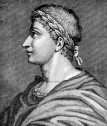Ovid

Publius Ovidius Naso (20 March 43 BC – AD 17/18), known as Ovid in the English-speaking world, was a Roman poet who is best known as the author of the three major collections of poetry, the Heroides, Amores and Ars Amatoria, and of the Metamorphoses, a mythological hexameter poem. He is also well known for the Fasti, about the Roman calendar, and the Tristia and Epistulae ex Ponto, two collections of poems written in exile on the Black Sea. Ovid was also the author of several smaller pieces, the Remedia Amoris, the Medicamina Faciei Femineae, and the long curse-poem Ibis. He also wrote a lost tragedy, Medea. He is considered a master of the elegiac couplet, and is traditionally ranked alongside Virgil and Horace as one of the three canonic poets of Latin literature. The scholar Quintilian considered him the last of the canonical Latin love elegists. His poetry, much imitated during Late Antiquity and the Middle Ages, greatly influenced European art and literature and remains as one of the most important sources of classical mythology. Ovid talks more about his own life than most other Roman poets. Information about his biography is drawn primarily from his poetry, especially Tristia 4.10, which gives a long autobiographical account of his life. Other sources include Seneca and Quintilian. Ovid was born in Sulmo (Sulmona), in an Apennine valley east of Rome, to an important equestrian family, on March 20, 43 BC. That was a significant year in Roman politics. He was educated in Rome in rhetoric under the teachers Arellius Fuscus and Porcius Latro with his brother who excelled at oratory. His father wished him to study rhetoric toward the practice of law. According to Seneca the Elder, Ovid tended to the emotional, not the argumentative pole of rhetoric. After the death of his brother at 20 years of age, Ovid renounced law and began travelling to Athens, Asia Minor, and Sicily. He held minor public posts, as one of the tresviri capitales and as one of the decemviri stlitibus iudicandis, but resigned to pursue poetry probably around 29–25 BC, a decision of which his father apparently disapproved.
 čeština
čeština Deutsch
Deutsch français
français magyar
magyar polski
polski русский
русский English
English Azərbaycan
Azərbaycan беларуская
беларуская italiano
italiano ქართული
ქართული Nederlands
Nederlands português
português slovenčina
slovenčina español
español 中文
中文 қазақ
қазақ








